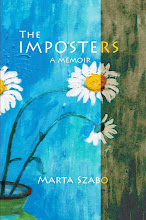My father liked to tell me things. I was his special friend in the family, the one he sought out to tell about his latest victory. He didn’t go to my mother and he did not go to either of my two younger sisters. He came to me, the first born.
He had dark hair pushed back from a high forehead with blue eyes and a straight nose. His face was big, square and he thought himself handsome. Others thought him handsome too. I did.
He spoke with a strong Hungarian accent though I didn’t know this until kids at school commented.
My mother was quiet and pale compared to my father. He was the one who burst into a room and took care of things, made noise, insisted that everyone smile and be happy and cheerful. My mother did not know what to say ever to anyone.
She was a shadow in the kitchen, sometimes the one who got angry, who yelled, who hit you. Not my father. He never yelled. His anger was more concentrated. It came out in stern lectures that made me cry because they seemed so mean.
In the beginning everything was better when Daddy was home. I felt safer, like there was someone at the helm. My mother often failed. When she drove she got lost or crashed into something. But my father never got lost and he drove with his elbow out the window, his wedding ring tapping the metal of the car roof in time to the Hungarian song he was singing with gusto.
He often had suitcases open, packing or unpacking for a business trip. Trips made him happy and I loved the drive to the airport to see him off or pick him up. When he returned he always had presents.
He wore suits and ties and white pressed shirts folded from the dry cleaner. He got dressed in front of the black and white TV that sat on top of the four-drawer gray filing cabinet in the small narrow room across from my mother’s room.
Still in my nightgown, I slipped into his unmade single bed and watched the man with the dark moustache on the TV read things from sheets of white paper he held in his hands while my father dressed, fresh from his bath.
His underwear and socks and shirts were kept on shelves at one end of the room, his suits and ties hung in a closet at the other end.
In between was a table with skinny black metal legs and a smooth brown top, his desk. On his desk was a small white plastic cube that held a roll of gray stamps so you could pull one out at a time. And he had a small red stapler.
When I was sick my mother put me in my father’s bed during the day so I could watch Captain Kangaroo and Romper Room. Outside the two windows grew a large tree, shading the room and its bare wood floor, a floor made with dark wide boards, stained and cracked with square nails. My mother said you could tell the house was old because of the wide boards and the square nails.
My father gives me a book with pages that are thick and black. He gives me a bottle of glue with an orange rubber top and a slit in the rubber. When you turn the bottle upside down and press on the rubbery part the glue – thick and honey-colored – comes slowly out. He gives me postcards – from where he has travelled in Europe and ones my grandmother in Budapest has sent – and tells me to stick the postcards in the book. He thinks there is something nice about the postcards, but I don’t like them – photographs of public buildings and monuments against sunny skies.
My father creates a shoe shine kit for me – flat round tins of polish – one black, one brown. They are hard to open. I have a brush and a cloth and my father wants me to shine his shoes when he comes home from work.
Then he buys some stamps and gives me an album with clear cellophane pockets to put them in.
And every Saturday after I clean my room he gives me a silver dollar to put in a savings account. He takes me to the bank, lifts me up onto the counter, shows me the little book. I prefer paper money though and wish he would give me that instead.
Wednesday, August 31, 2011
Subscribe to:
Posts (Atom)




